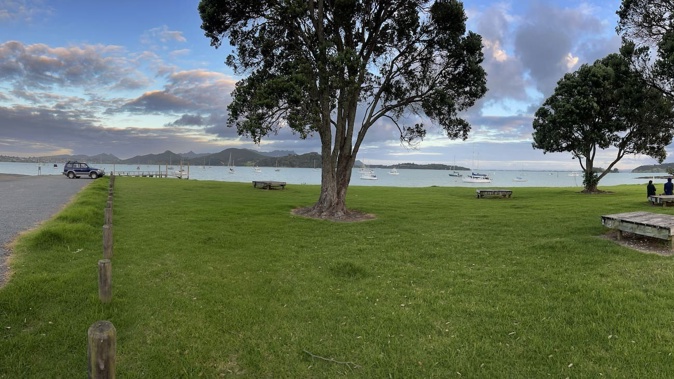
A homeless family spent nearly three months in tents at a popular beachside camping area in Whangārei despite complaints about their behaviour.
Members of the public reported the family to various agencies and questioned how it was allowed to set up home, take up so much space, and stay so long, in the freedom camping area near the Parua Bay Yacht Club in Whangārei Heads.
The family reportedly included about 20 adults, a baby, at least nine young children, two dogs, and a caged cat.
Whangārei District Council health and bylaws manager Reiner Mussle said the campers were an extended family of homeless people and had been at the site since at least last November.
They left for reasons unknown to council on or about January 22.
Sources claimed some of the group were verbally abusive to passers-by, verbally and physically abusive to each other, and that police were “out there day and night”.
Police said they had received about a dozen reports about issues in the area.
“Of these, the majority were family harm matters and police attended, taking appropriate action at the time,” a police spokesman said.
Mussle confirmed the council and its regulatory services contractor Armourguard had received 20 complaints about the group at the council managed freedom camping area.
The complaints were mainly that the group should not be allowed to live at the site and should be moved on. There were also complaints about dogs, noise, and litter.
A large sign details the normal freedom rules, including a three-night stay limit, for the tent site and other areas at Parua Bay. Photo / NZME
Mussle said the site had been kept tidy and clean - evident during visits by council’s contractors.
“Animal Management found no evidence of breaches of the Dog Control Act or our related Bylaw / Policy, requiring action or enforcement. Despite that, education and guidance was given and followed.”
Oranga Tamariki Regional Commissioner Te Tai Tokerau Anya Tahere said they had been aware of the situation but could not go into specific details to protect the children’s privacy.
Tahere said Oranga Tamariki was working with its partner agencies in response to concerns.
Mussle said homeless people were specifically excluded from freedom camping legislation, bylaw rules and restrictions because homelessness was a focus of central government.
“This family was waiting for social housing, staying in an area where tents are allowed and was exempt from the freedom camping rules.
“Ultimately we take a risk-based approach to these situations on public land. We have also taken into account the housing shortage, and the time of year," he said.
 The area highlighted green is where camping in tents is permitted within Whangārei District Council's freedom camping zone at Parua Bay. WDC / Google / NZ Herald graphic
The area highlighted green is where camping in tents is permitted within Whangārei District Council's freedom camping zone at Parua Bay. WDC / Google / NZ Herald graphic
Mussle said council faced many challenges when dealing with genuine homelessness. It worked with social agencies trying to find permanent solutions and to address related issues.
“Council has no control over aggressive or intimidating behaviour by members of the public anywhere and any such concerns need to be reported to the police for action.”
A proposed night shelter for homeless people in Whangārei failed to get off the ground following a petition by rough sleeper Jason Poutai.
The former Old Boys' Rugby Club on Port Rd was identified as a potential option for a shelter but the council said in 2024 that the proposal put forward for the site, which it owns, was lacking and that providing a shelter is not council’s role.
Council has not spoken for or against a shelter in Whangārei and has said it is committed to working alongside government agencies to find sustainable solutions to the challenges within the community.
Sarah Curtis is a news reporter for the Northern Advocate with nearly 20 years experience in journalism - mainly as a court reporter on the East Coast. She is passionate about justice and environmental issues, and hopes to give a voice to those who often go unheard.
Take your Radio, Podcasts and Music with you









